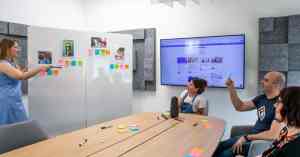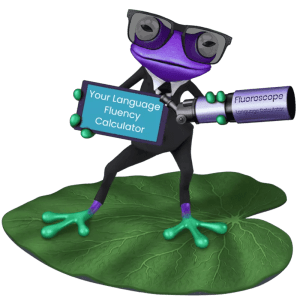Why Is Learning a Language So Hard?
How adults can learn from children.
For adults learning a new language, it can feel like a long and arduous process. Studies have shown that young children have a much easier time learning a new or native language than their parents. As we age, our once-malleable brains have become set in their ways. This makes retaining new information extremely challenging and oftentimes off-putting.
In this blog post, we will examine the problems adult learners face in their language studies, and how children can provide the answers.
In an article by Ghasemi and Hashemi, they define the cut-off age for “easy” language learning as 10 years or younger. If a child learns a new language before this, they will have a much easier time sounding like a true native speaker. This is particularly interesting considering many curriculums begin teaching students from a range of 9-11 years of age.
In fact, some students don’t explore other languages until their adolescent years in secondary school. In many of these cases, the window of opportunity for the childhood boost is long past. Due to the less-immersive nature of traditional schools, most of these students will receive a very basic understanding of the language and retain very little.
After this somewhat vague introduction to language skills have been experienced in the public school system, many adults will feel disheartened and write off language learning completely. Many of us know it can take years to build up this skill, but what if we could speed up the process?
This is where we turn to child education. A child under the age of 5 can potentially learn up to 5 languages. This is because, when they are born, their brain is flexible, and simplifies the learning process into 3 simple steps:
Learning Sounds
The English language consists of about 44 phonemes. A baby is born with the capacity to utilize all 150 phonemes which make up every language on earth! As we grow older, we choose the phonemes we require to communicate, but never explore our full sound-making potential.
The important thing to remember is we were all capable of making these sounds once, and we can revive that capability with practice. Studies have also shown that inhibition is what separates the child brain from the adult brain. Children don’t know embarrassment, shame, or guilt. Without these roadblocks there to stunt the learning process, they can freely explore every sound they make.
Adult learners must approach foreign languages in the same way. By working to eliminate self-conscious thoughts, these students can have a much easier time learning new phonemes.
Learning Words
An infant’s use of phonemes will eventually graduate to morphemes, this is when the sound they’re making starts to have meaning behind it. Morphemes are the middle ground between sounds and words where “Ma” and “Da” are sounds used to describe a parent, without fully knowing the words “mother and father” yet.
Adults learning new challenging languages can use this method as well. When we search for words in our foreign vocabulary, we may know the meaning of the word and only a small portion of it. This is where we can simplify words and phrases to the bare minimum to test how much we know and what we need to learn next.
Learning Sentences
At this critical period, children have acquired many words from their morphemes, and go through a self-organization phase. During this time they will ramble out commands and ideas without any rhyme or reason, such as: “The cookie is want” when they really mean “I want the cookie”. A lot of time will be spent making sense of words and trying to express them in a meaningful and clear way.
This is something adult learners also experience, as it is important to learn the fundamentals of vocabulary and meaning first. Once a language student has given meaning to every word in an idea, they will be able to form a coherent sentence. Children and Adults can both test their language learning abilities by reading jumbled-up sentences and rearranging them into something with meaning.

What Children Can Teach Us About Language
Sometimes there are distinct advantages in life that pass us by. Since the infant’s brain is hardwired to acquire English skills, it’s important to acknowledge that we might never experience such a clear opportunity for this form of learning again. The reason is that infants have natural instincts for survival. As babies, we learned what we required in order to socialize and express feelings or desires. We needed to do this in order to thrive in society. A child would not learn language acquisition so quickly if it was not directly tied to these immediate needs.
Of course, it doesn’t hurt that babies have nothing else to do with their time apart from watching and learning. Adults do not have the luxury of following people around to acquire knowledge. People have jobs, responsibilities, and other hobbies they must balance alongside learning a language!
But do not let this dishearten you. These instincts might not be as easy for us to access language acquisition as an infant, but they can be re-learned. In the following list we will discover instincts we can harness from infants to aid our own learning:
Listening first, talking later
Studies on English speakers have shown that infants learn language by listening first. This begins in the womb and then continues into their first year of life. Only when a child has listened enough will they feel reading to start attempting to communicate. As previously mentioned, Babies will spend a lot of time taking in sounds and applying meaning to them. This requires a lot of time not making sounds at all and studying their parents. This applies to even the hardest languages on the planet, not just the English language.
Adult learners can take a page from this book! By immersing themselves in a language they will be able to pick up familiar sounds and attribute meaning to them over time. It is important for someone learning a language to spend a lot of time watching films, listening to music, and in extreme cases – moving to the country of origin!
In school we learn that writers do a lot of reading, athletes rewatch games over and over, and scientists spend a lot of time studying other experiments. Language learners must always spend time listening to the language first.
Making mistakes
Infants and toddlers spent a lot of time fumbling over their words and stringing together incoherent sentences. Instead of being disheartened or embarrassed, they simply accept that they are wrong and fix the error through endless repetition. Babies don’t have time to worry about the judgement of others.
This is an important part of learning a language through all ages. Adults need to understand that everyone learning a language is in the same boat, making the same mistakes. The native speaker you are conversing with is likely just as embarrassed trying to speak your language. Don’t be embarrassed, everyone was a beginner at some point!
But what if you can’t seem to shake that feeling? What if you’re not confident enough to practice in a class of 20+ people? An excellent way to make mistakes without confusing native speakers/peers is to practice in solitude first. Build up confidence in the comfort of your home with a listening device or app that reads alongside you. This way, you won’t need to worry about embarrassment, and when you finally do show off your skills, you can feel more confident in your mistakes.
Failure is not an option
When children are learning their first words, they do not consider giving up at the first sign of imperfection. This is because infants don’t understand the concept of failure yet. They know if they cannot communicate with people around them, they will have a much harder time getting what they want. Failure is something we learn as we get older, and every adult has experienced some form of failure multiple times.
In terms of adult learning, this is commonly replicated by moving to the country of the language you’re learning. If you do not speak the language, you cannot order food, speak on the phone, or even navigate public transit. You need basic knowledge of a language to get by.
By producing an immediate need, the learner eliminates the tempting possibility of giving up. However, if you cannot afford a plane ticket, or do not want to uproot your life, immersion classes where everyone speaks the language are the next best thing. Putting students in situations where they can’t “opt-out” can help those who are tempted to give up after the first try.
But what if your schedule is too busy for classes? What if you would prefer privacy to start out with? There are apps that exist for this exact reason. Language apps can be a useful stepping stone for the language learner who values convenience on their path to success. Whatever your comfort level, whatever extra time you have, you can find a wealth of resources to practice your English vocabulary and reach your daily goals.

Frequently Asked Questions
Many people believe that the hardest part of learning a new language is mastering the grammar. However, while grammar can be a challenge, it is often the vocabulary that presents the biggest obstacle. In order to be able to express oneself properly, one needs to have a large working knowledge of words. And for many adults, it can be difficult to find the time to commit to learning an entirely new set of words.
While younger learners are able to quickly pick up new vocabulary and grammar rules, older learners may find it more difficult to remember new information. In addition, older adults are often less patient than younger learners and may be less motivated to put in the effort required to learn a new language. As a result, it is generally more difficult for older adults to learn a new language than it is for younger learners. However, this does not mean that it is impossible for older adults to learn a language.
There are a number of reasons for this. For one thing, adults generally have more developed linguistic skills than children, which can actually work against them when learning a new language. Because they are already comfortable with the rules of their native tongue, adults often find it difficult to break old habits and adopt new ones.
While there are a number of factors that can affect how quickly someone learns a new language, research has shown that it typically takes around 600 hours of study to reach a level of proficiency that allows for basic conversation. However, becoming truly fluent in a language – meaning being able to understand native speakers and communicate without difficulty – can take much longer. For most people, it takes several years of dedicated study to reach this level.
One study found that older adults were more likely than younger adults to make errors when naming objects or producing sentences. The study also found that the rate of decline was greater for those who had difficulty with language tasks in early life. While the exact cause of this decline is not yet known, it is thought to be due to changes in the brain that occur with age.
The question of whether it is harder to learn as you get older is a complex one. On the one hand, the ageing process does lead to some cognitive decline. For example, older adults often have more difficulty remembering new information. However, there are also a number of factors that can make learning easier for older adults. For instance, they often have more life experience to draw upon, and they are generally more motivated to learn. In addition, advances in technology have made it easier for older adults to access educational resources.
Learning a new language is a challenge for many reasons. First, it can be difficult to find resources that are both accurate and effective. While there are many language learning apps and websites available, the quality of these materials can vary greatly. In addition, it can be hard to stay motivated when studying on your own. It can be easy to get discouraged when making progress is slow, and it can be difficult to find someone to practice with on a regular basis.
While there are many factors that can contribute to the difficulty of learning a new language, one of the most important is the level of exposure. When we are constantly immersed in a language, whether through conversation or media, it becomes much easier to pick up the nuances and subtleties that are so essential to mastering communication. However, when we only encounter a language sporadically, it becomes much more difficult to progress beyond a basic level of proficiency.
Learning a new language can be difficult for a number of reasons. It can be difficult to find the time to dedicate to learning a new language. For most people, it is already difficult to find time to balance work, family, and social obligations. Adding in language lessons can be overwhelming.
Learning with LillyPad
Now we know how to implement childhood instincts into adult learning, you might be asking “where can I apply these strategies”? In the age of information, we have a wide variety of material in other languages. LillyPad allows you to compile all of this material (ie. Blogs, Newspapers, Books, and Files) into one convenient app. You can practice your English pronunciation, learn grammar rules, and even learn other European languages. The Artificial language tutor Lilly alleviates your foreign language anxiety and guides you through intensive language exercises. Join today and have fun with language learning!
Learn from History – Follow the Science – Listen to the Experts
What’s the one thing that makes LillyPad so special? Lilly! She is an artificially intelligent English tutor, and has people talking all over the world! Lilly makes improving your English easy. With Lilly, you can read in four different ways, and you can read just about anything you love. And learning with Lilly, well that’s what you call liberating!
For learners of all ages striving to improve their English, LillyPad combines the most scientifically studied and recommended path to achieving English fluency and proficiency with today’s most brilliant technologies!
Additionally, the platform incorporates goal-setting capabilities, essential tracking & reporting, gamification, anywhere-anytime convenience, and significant cost savings in comparison to traditional tutoring methodologies.
At LillyPad, everything we do is focused on delivering a personalized journey that is meaningful and life-changing for our members. LillyPad isn’t just the next chapter in English learning…
…it’s a whole new story!
Do you want to improve your English? Visit www.lillypad.ai.
Follow us on Facebook or Instagram!
Note: iOS is currently unavailable.

Bethany MacDonald
Bethany MacDonald has contributed articles LillyPad.ai since 2020. As their Blog Lead, she specialises in informative pieces on culture, education, and language learning










